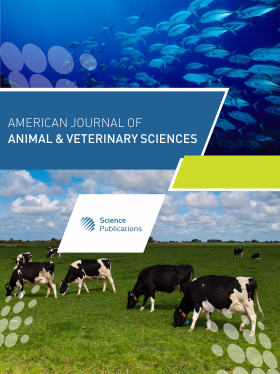Dietary Inclusion of Sunflower Seed Alters Blood Plasma and Endometrium Lipid Profile in Beef Cows
- 1 Department of Biological Sciences, São Paulo State University (UNESP-FCL), Brazil
- 2 Provimi, Cargill Animal Nutrition, Lewisburg, Pensilvânia, United States
- 3 Department of Animal Science, University of São Paulo (USP-ESALQ), Piracicaba, São Paulo, Brazil
- 4 Department of Animal Reproduction, University of São Paulo (USP-FMVZ), Pirassununga, São Paulo, Brazil
- 5 MF Vetplan, Águas da Prata, São Paulo, Brazil
- 6 Department of Biophysics and Pharmacology, São Paulo State University (UNESP-IBB), Botucatu, São Paulo, Brazil
- 7 Department of Animal Production, São Paulo State University (UNESP-FCAT), Dracena, São Paulo, Brazil
Abstract
Polyunsaturated Fatty Acids (PUFA)-enriched diets are recognized as a significant approach for improving the reproductive efficiency of cattle. The aim of this study was to evaluate the effects of sunflower seed, a PUFA-rich feed source, supplementation on plasma and endometrium lipid profiles in beef cattle. It was hypothesized that feeding of sunflower seed has an additional effect on PUFA that causes changes in the profiles of total cholesterol, Low-Density Lipoprotein (LDL), High-Density Lipoprotein (HDL), and triglycerides plasma concentrations, and endometrium fatty acids composition. For such, 60 Nelore cows had their ovulation synchronized and were then fed 1.7 kg/day/animal of control diet composed of soybean meal and corn or enriched with sunflower seed. Both diets were provided in troughs maintaining the measure of 22 linear cm/trough/animal. The cows were supplemented for 6 (D0-D5), 14 (D0-D13), or 22 days (D0-D21), according to the experimental group, from the expected estrus (D0) and blood was collected throughout the treatment. 24 h after receiving the last supplementation, 15 control, and 15 treated cows were slaughtered for analysis of blood plasma and endometrium lipid profile. The plasma lipid concentrations were assessed through the utilization of commercially available colorimetric kits employings an enzymatic method in an automated analyzer. The endometrial fatty acids profile was analyzed by gas chromatography. Treated cows presented increased total plasma cholesterol concentrations on D18 and D21; Increased HDL concentrations on D10, D14, D18, and D21; and increased LDL concentrations on D21 (p<0.05); but no difference in triglycerides. Furthermore, feeding sunflower seed to beef cows increased endometrial concentrations of C18:1 T10-T11-T12 and C10:1 and decreased those of iso-C15:0, C20:5, C20:3 n3, C23:0, C24:0 and C22:5 fatty acids. We conclude that feeding beef cows with 1.7 kg/day/animal of sunflower seed alters the lipid profile of plasma and endometrium and that such changes are potentially associated with higher reproductive efficiency.
DOI: https://doi.org/10.3844/ajavsp.2023.156.165

- 1,692 Views
- 1,256 Downloads
- 0 Citations
Download
Keywords
- Linoleic Acid
- Lipid
- Prostaglandin
- Embryonic Mortality
- Cattle
